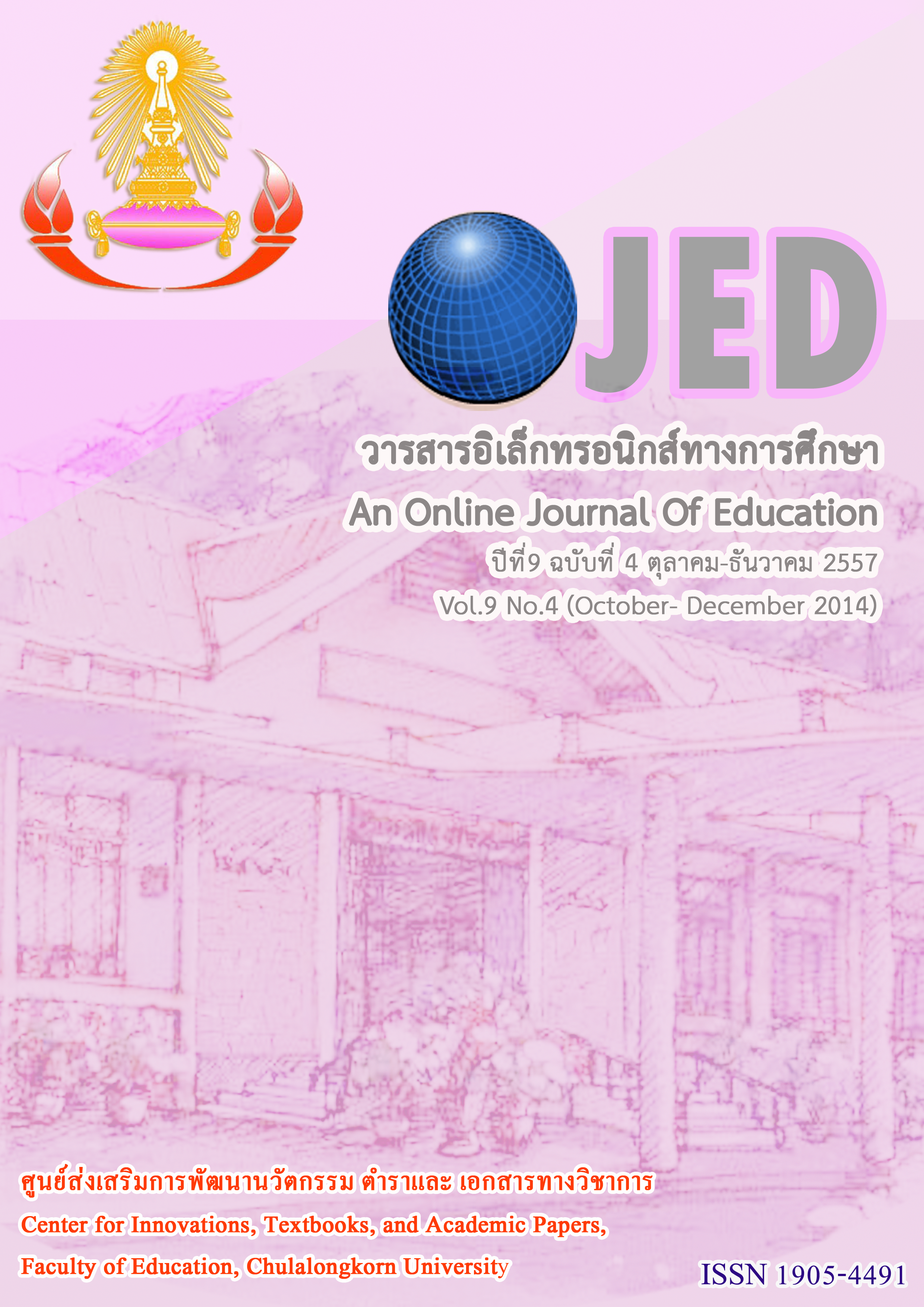การจัดการความรู้ของครูภูมิปัญญาไทยเพื่อส่งเสริมการเรียนรู้ตลอดชีวิตของชุมชนในเขตภาคใต้
Keywords:
การจัดการความรู้, ครูภูมิปัญญาไทย, การเรียนรู้ตลอดชีวิต, KNOWLEDGE MANAGEMENT, THAI WISDOM TEACHERS, LIFELONG LEARNINGAbstract
บทคัดย่อ
การวิจัยในครั้งนี้มีวัตถุประสงค์ 1) เพื่อวิเคราะห์กระบวนการจัดการความรู้ของครูภูมิปัญญาไทยเพื่อส่งเสริมการเรียนรู้ตลอดชีวิตของชุมชนและ 2) เพื่อสังเคราะห์ข้อเสนอแนะในการนากระบวนการจัดการความรู้ของครูภูมิปัญญาไทยไปใช้เพื่อส่งเสริมการเรียนรู้ตลอดชีวิตของชุมชน โดยมีกลุ่มตัวอย่าง คือ ครูภูมิปัญญาไทยในเขตภาคใต้ 9 ท่าน โดยใช้การสุ่มตัวอย่างแบบเจาะจง เก็บรวบรวมข้อมูลด้วยแบบสัมภาษณ์ แบบสังเกตและแนวทางการสนทนากลุ่ม
ผลการวิจัย พบว่า 1) กระบวนการจัดการความรู้ของครูภูมิปัญญาไทยในเขตภาคใต้ ประกอบด้วย(1) การแสวงหาความรู้จากแหล่งความรู้ภายในที่เกิดจากการเรียนรู้ผ่านประสบการณ์ และความรู้ภายนอกที่เกิดจากการเรียนรู้จากการอ่านสื่อสิ่งพิมพ์ (2) การสร้างความรู้จากการทำงานหรือจากการนำความรู้ที่มีอยู่ผนวกเข้ากับความรู้ใหม่(3) การจัดเก็บและการรวบรวมความรู้ด้วยวิธีการที่หลากหลาย (4) การถ่ายทอดความรู้ด้วยเทคนิควิธีการต่าง ๆ และ(5) การแบ่งปันและเผยแพร่ความรู้ด้วยการพบปะพูดคุยผ่านเครือข่ายการเรียนรู้ของชุมชน ผ่านสื่อต่างๆ และผ่านเครือข่ายอินเตอร์เน็ต 2) ข้อเสนอแนะในการนำกระบวนการจัดการความรู้ของครูภูมิปัญญาไทยไปใช้เพื่อส่งเสริมการเรียนรู้ตลอดชีวิตของชุมชนพบว่า (1) ด้านการแสวงหาความรู้ ควรมีการส่งเสริมการแสวงหาความรู้จากการเรียนรู้จากการกระทำเพื่อให้เกิดการเรียนรู้ที่รู้ลึกและรู้จริง (2) ด้านการสร้างความรู้ ควรมีการสร้างความรู้จากข้อมูลข่าวสาร หรือมีการสร้างความรู้ของชุมชนจากภายในและภายนอก (3) ด้านการจัดเก็บและรวบรวมความรู้ ต้องมีการนำเทคโนโลยีสารสนเทศที่ทันสมัยเข้ามาสนับสนุนในการปฏิบัติงานเพื่อให้เกิดการเรียนรู้ทั้งชุมชน (4) ด้านการถ่ายทอด จำเป็นต้องถ่ายทอดจากการได้เข้าไปสัมผัสจริงในชุมชนนั้น ๆ เพื่อให้เกิดความรู้ ความเข้าใจ และ (5) ด้านการแบ่งปันและเผยแพร่ความรู้ควรมีการเผยแพร่ความรู้โดยใช้สื่อที่สร้างสรรค์ สื่อดิจิตอลและควรมีแนวทางสนับสนุนการนำไปปฏิบัติ
คำสำคัญ: การจัดการความรู้/ครูภูมิปัญญาไทย/การเรียนรู้ตลอดชีวิต
Abstract
The purposes of this research were to:1) analyze the knowledge management process of teachers of Thai traditional knowledge to promote lifelong learning in southern communities in Thailand and 2)synthesize the suggestions to apply the knowledge management process. The research participants were nine teachers of traditional Thai knowledge in the south of Thailand. The instruments used in the study were an interview form, an observation form and a focus group.
Results indicate that knowledge management processes of teachers of traditional Thai knowledge comprised (1) knowledge acquisition from internal and external sources, (1.2) knowledge creation from work or from combining their own knowledge with the newly acquired, (1.3) knowledge storage and compilation through a variety of methods,(1.4)transfer of knowledge by various means, and(1.5) knowledge sharing and dissemination through community meetings, various media, and internet network groups. 2)suggestions for applying the knowledge management process to promote lifelong learning in the communities included (2.1)the acquisition of knowledge should be from action and experiential-based learning, (2.2) creation of knowledge should be from community-based information, from both internal and external sources, (2.3) the storage and compilation of knowledge should use more modern information technology to support community learning,(2.4)the transfer of knowledge should undertake to transfer the experience within the community context, and (2.5) the sharing and dissemination of knowledge should be done with the use of creative and digital media, and there should be guidelines to support actual practice.
KEYWORDS: KNOWLEDGE MANAGEMENT/THAI WISDOM TEACHERS/LIFELONG LEARNING




